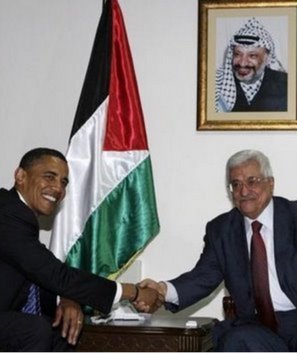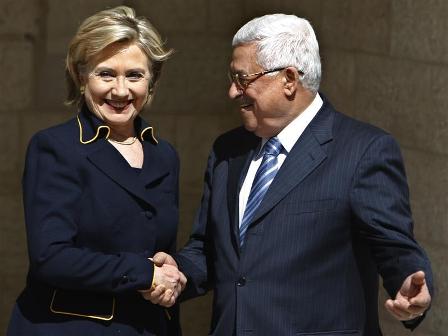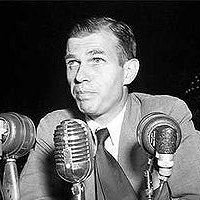Two articles from Barry Rubin on the U.S.-Israel Crisis and how the Palestinian Authority is refusing to start negotiations with Israel.
by Barry Rubin
Explaining the U.S.-Israel Crisis
Pubished: march 15, 2010.
It is important to understand that the current controversy over construction in east Jerusalem is neither a public relations’ problem nor a bilateral policy dispute. It arises because of things having nothing directly to do with this specific point.
What are the real issues involved:
1. The U.S. and most European governments are determined not to criticize the Palestinian Authority’s (PA) sabotage of the peace process. The facts are clear: The PA rejects negotiations for fourteen months. No reaction. The PA makes President Barack Obama look foolish by destroying his September 2009 initiative saying there would be talks within two months. The PA broke its promise to Obama not to sponsor the Goldstone report. In the end, the PA still won’t talk directly. Yet during fourteen months in office the Obama administration has not criticized the PA once. The point is clear: The U.S. government will never criticize the PA no matter what it does. (We’ll talk about why this is so in a moment.)
2. Same thing regarding Syria. Dictator Bashar al-Assad supports terrorists who kill the United States in Iraq; kills Lebanese politicians; openly laughs at U.S. policy; and invites Iran’s president immediately after a major U.S. concession. Yet the Obama Administration makes no criticism and in fact offers more concessions.
3. The United States will criticize Iran but will not take a tough and vigorous stand against it. Now it is mid-March and no higher sanctions. Indeed, the administration’s sanctions’ campaign is falling apart.
4. On whom can the Administration’s failures be blamed? Answer: Israel. Since it is a friend of the United States and to some degree dependent on it, no matter what the Obama Administration does to Israel that country has no wish or way to retaliate. It is safe to beat up on Israel.
5. By doing so, the Administration gets Europeans to go alone easily and can say to Arabs and Muslims: See we are tough on Israel so you should be nice to us.
6. What does the U.S. government want? A lot of things. An easier withdrawal from Iraq; popularity; quiet; nobody attacking it verbally or materially (at least not so its constituents will hear the attacks); an ability to claim success or at least claim it would have been successful on the peace process if not for Israel; supposedly, Arab support for its doing something on Iran; hopefully, less terrorism; and so on.
7. There is also an ideological aspect given the Administration’s general worldview, which need not be repeated here at length. But large elements in the government apparently have so accepted the manifestly untrue idea that everything in the region is linked to the Arab-Israeli conflict that high-level officials have reportedly remarked that the construction of apartments in east Jerusalem jeopardize the lives of American soldiers in Iraq and Afghanistan or that Arab states won’t cooperate with the United States because of the U.S.-Israel relationship.
The argument that U.S.-Arab relations rests on U.S.-Israel relations has been repeated for a half-century and repeatedly proven wrong. American attempts to resolve the conflict have rarely received help from the Arab world, and often been bitterly opposed. At the same time, Arab states have repetedly functioned on the basis of their own interests to seek U.S. help because they recognized American power: to convoy tankers and deter Iran during the Iran-Iraq war, to reverse Iraq’s invasion of Kuwait, to protect them from Iran and revolutionary Islamists today, and in dozens of other cases. They may say that everything depends on Israel but that is propaganda.
By the same token, if the Arab world–that is the relative moderates–isn’t being helpful to the United States now, this is due to the fact that such action is often against the interests of states and precisely because they do not view America as a strong and reliable power today. That is the result of Administration policies.
No matter what the Administration does to Israel, these things won’t change. In short, the Administration is falling for the oldest trick, the most venerable con-game, in the Middle East book: Move away from Israel, pressure Israel, solve the conflict, and all the Arab governments will love America and do what it wants them to do.
What makes this even more ridiculous is that now the United States is focusing on Iran and Afghanistan, places where Israel-Palestinian issues clearly have zero effect on events. Sunni and Shia Iraqis aren’t in conflict because of Israel; Sunni insurgents aren’t attacking American troops because of Israel. Al-Qaida and the Taliban aren’t fighting to seize power in Afghanistan and Pakistan because of Israel. And al-Qaida isn’t seeking to overturn all Arab regimes, create an Islamist government, and destroy any Western role in the Middle East because of Israel.
And even if the Israel issue may be one factor affecting the attitudes of Arabs toward revolutionary Islamism it is only a single factor among many. The people prone to supporting revolutionary Islamism won’t interpret an American conflict with Israel as showing the goodness of Obama but the weakness of Obama and the coming triumph of Iran in the region.
8. The handling of this issue is also counterproductive because it ensures Israel-Palestinian talks won’t get going again. After all, if the United States is so angry at Israel why should the PA and Arab states defuse the crisis? They will raise their demands because they win either way: If the United States forces Israel to make more concessions then they get something for nothing. But if Israel doesn’t make those concessions then it gets blamed for the impasse and the Arab side profits from reduced U.S. support for Israel. As for the radical forces–Iran, Syria, Hamas, and Hizballah–they aren’t going to become pro-American or support a real peace process no matter what happens.
Consequently, just as with the original demand for a freeze on construction, the Administration has once gain shot itself in the foot. The chances for even indirect talks in 2010 has gone to virtually zero as a result. Israel didn’t do it; the U.S. government did. Ironically, the United States will end up losing more from this than Israel because nothing much is going to be altered regarding Israel-Palestinian issues but a great deal is changing in the larger regional situation.
Why is this all not more worrisome for Israel? This is so for several reasons. First, the Administration is not going to do much or anything against Israel in material terms. It is not a tough government and doesn’t want confrontations. Its goal is not to injure Israel but to make itself look good. Moreover, it knows that pushing harder won’t bring any reward since Israel won’t yield and the peace process is going nowhere.
Second, Israel is protected by a very strongly favorable American public opinion and by Congress. At this point, Congress is no longer cowed by Obama. Indeed, the Democrats are angry with him for endangering their survival by the unpopular actions he is pressing on them. They know that the November elections look very bad for them. Taking on Israel will make things even worse. And they also have a better understanding of the radical forces in the region and the threat they pose. In other words, they are not so far left as is the White House. After the November elections, the Administration will be on even weaker political ground, especially vis-à-vis Israel.
Third, the Obama Administration’s strategy won’t work. The radicals will become more aggressive; the more moderate Arabs know that the Administration won’t credibly defend them. Sensing blood (albeit mistakenly) the PA will raise its demands higher. The PA could only exploit the opportunity if it demanded final status talks—something it would never do—and try to get the best possible peace agreement with U.S. support. But since they won’t deliver for the Administration, they won’t collect much from it.
Eventually, the extremism of Iran, Syria, the Iraqi insurgents, Hamas, Hizballah, Libya, and to a lesser degree the PA will force a shift in U.S. strategy. Either the Obama Administration will adjust accordingly—at least partly—or will not survive its own electoral test. (This is not to underrate economic factors, which remain the highest priority for Americans, but it is unlikely that these will “save” the Administration, quite the contrary. A continuing economic mess plus foreign policy disasters would make its situation worse.)
This current crisis will blow over when the Administration grows tired of it and has wrung all the benefits it can from the issue, and not before.
Optional notes: This is not to underrate the importance of the bad timing by an Israeli ministry, letting the PA pretend that Israel wrecked a negotiating opportunity. The one thing a politician can never forgive is someone else making him look bad. Unfortunately, this Administration is only concerned about friends making it look bad, letting enemies get away with it repeatedly.
But a more serious U.S. government would not have let that game happen and would have been more even-handed in attributing blame. Such a government would have seized on Prime Minister Benjamin Netanyahu’s apology, asked that the building be postponed, and pushed the two sides together to talk. Instead, the Obama Administration just accepted the PA walk out as if it were powerless to do anything.
I have been informed that on a number of occasions that my criticisms of the Obama Administration have led to my being denied certain opportunities regarding projects and writing venues. I can only repeat that my criticism is a response to the government’s policies. I’d be far happier if they had a better policy and more competent implementation so that it would be possible to praise the government of the United States rather than have to criticize it.
The Palestinian Authority walks out of talks with a big smile on its face.
Published: march 12, 2010.
In 1994, Israel asserted, and the PLO accepted, that construction would continue on existing Jewish settlements. For the next 15 years, negotiations were never stopped by that building.
In January 2009, the Palestinian Authority (PA) stopped negotiations because Hamas attacked Israel from the Gaza Strip and Israel defended itself. Of course, Hamas is also the PA’s enemy and the PA would be delighted if Israel destroyed that group. But for public relations’ purposes, the PA had to pretend inter-Palestinian solidarity.
Then came President Barack Obama who demanded a stop to all construction on settlements in 2009. Israel finally complied but announced that it would keep building in east Jerusalem. The United States accepted that arrangement and even highly praised Israel’s policy as a major concession.
But the PA refused to return to negotiations. Why, because the construction offended it? No, because the PA’s radical forces don’t want to make a peace deal because they believe they can win total victory and destroy Israel. The more moderate forces are too weak to make a deal because of Hamas and their own radicals, though they also have some problems with mutual compromise.
In September 2009, Obama announced that within two months there would be full and final peace negotiations in Washington. Israeli Prime Minister Benjamin Netanyahu said “yes”: PA leader Mahmoud Abbas said “no.”
No Western media outlet said that the PA refusal to negotiate for—as of today—about 15 months shows that the PA doesn’t want peace. Yet they had no hesitation about saying that Israel doesn’t want peace (or at least maybe doesn’t) because Israel announced the building of apartments on the basis of a policy it has followed for 16 years, without serious complaint for most of that time.
Abbas seized on the opportunity to declare that he wasn’t going to negotiate. Is he indignant? Upset? Does he feel betrayed? No, he’s delighted to have an excuse to do what he wants to do anyway: Not negotiate with Israel!
Just like the famous scene in the film Casablanca when the police inspector, Renault, who regularly gambles at Rick’s Place decided to shut down the nightclub:
Rick: How can you close me down? On what grounds?
Renault: “I am shocked shocked to find that gambling is going on in here!”
The croupier comes out of the gambling room and up to Renault. He hands him a roll of bills. Croupier: “Your winnings, sir.”
Renault: “Oh thank you very much. [He turns to the crowd] Everybody out at once!”
And so he gets to close down talks, keep his winnings, and blame it on Israel. While Abbas and the PA don’t agree with Iranian President Mahmoud Ahmadinejad on much, they do agree on one point: They claim that the West is abandoning Israel so why should they not just wait for it either to be destroyed (in Ahmadinejad’s case) or until the West gives the Palestinians a state on a silver platter with no concessions on their part (Abbas’s case).
Just as Obama killed the chance for negotiations with his demand for a full freeze, he and Vice-President Joe Biden may have done so again for indirect talks. But isn’t it Israel’s fault in the latter case for a stupid bureaucratic case of bad timing? Absolutely, yes. Yet the U.S. handling of the issue turned an annoying problem into an even worse problem for itself.
[Note: U.S. officials are claiming that talks will still take place, saying that reports of Abbas walking out are untrue. I don’t believe this but if so I will correct this article accordingly.]
Even those in the West who mistrust or hate Israel, or at least the current government, have created a monumental paradox for themselves. They say (wrongly, I should point out) that Israel (or Netanyahu) doesn’t want to negotiate or make a deal. If so, however, why are they “punishing” Israel by letting negotiations be killed? One of the many knots one gets into if there’s no understanding of Middle East politics and realities.
About the Author:
Barry Rubin is director of the Global Research in International Affairs (GLORIA) Center and editor of the Middle East Review of International Affairs (MERIA) Journal. His latest books are The Israel-Arab Reader (seventh edition), The Long War for Freedom: The Arab Struggle for Democracy in the Middle East (Wiley), and The Truth About Syria (Palgrave-Macmillan). His new edited books include Lebanon: Liberation, Conflict and Crisis; Guide to Islamist Movements; Conflict and Insurgency in the Middle East; and The Muslim Brotherhood.



 RSS
RSS














The US-Israel crisis and the PA's refusal to start negotiations #israel #US #tcot #jcot http://j.mp/csP85C
RT @CrethiPlethi: The US-Israel crisis and the PA's refusal to start negotiations #israel #US #tcot #jcot http://j.mp/csP85C
It’s time to admit the truth: the war in Iraq is due to oil and government contracts to private companies, not knocking down the Towers and killing so many Americans. The White House knew these terrorists were in the country and did NOTHING! They waste time and money chasing after Mexican illigals who do us no phyiscal harm, and are doing jobs most American lazy pelple will not lower themselves to do! QUIT LYING TO THE AMERICAN PEOPLE ABOUT why we are in Iraq! We have oil resources here in American we could appropriate but for the goody two shoes who are on the side of minows, the gnats, the rats and the worms on the earth and care nothing about the people. Save the Whales, sacrifice the people! This country is being led by IDIOTS who are only interested in lining their pockets. WANT TO BE RICH? BECOME A CONGRESSMAN!